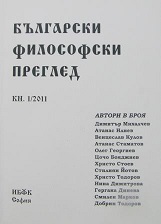Препрочитайки Димитър Михалчев
Rereading Dimitur Mihalchev
Author(s): Ventseslav KoulovSubject(s): Philosophy
Published by: Институт за българска философска култура
Summary/Abstract: Dimitur Mihalchev is the most prominent Bulgarian philosopher but today there is no interest in his views. The aim of this article is to prove that some of Dimitur Mihalchev’s ideas sound up-to-date and that the absence of his philosophy from the philosophical debate in Bulgaria is not a positive phenomenon. The resurgence of the interest in this philosophy would help the Bulgarian philosophical community get rid of the legacy of dialectical materialism and of the isolation in which it was placed by its dominant role during the period of socialism. The article consists of two parts – informative and discussible. The informative part is a concise presentation of the main points of the philosophy of J. Rehmke and D. Mihalchev. The views of D. Mihalchev on philosophy (what is philosophy), on ontology and on the theory of knowledge (or “logic” as it was called by Rehmke) are presented in the article. The main point of the concept on philosophy is that it is a common science – a science on the most common concepts which function in everyday language as well as in formal sciences (physics, biology, psychology, etc.) The problems of philosophy have traditionally been focused on two ideas: what is the world as a whole – what is its essence or foundation – and what is knowledge. So far however philosophy has been unable to rise to the level of a common science because it has been marked by prejudice. According to Mihalchev this fault could be overcome when initially the philosophical analysis is based on an absolutely certain and at the same time liberal enough (as regards the different possible solutions of the philosophical problems) tenet. This tenet is the principle invented by Rehmke on “the giveness of the given”. The “given” is a synonym of “to be known”, it means a matter of consciousness; giveness is not a qualification, it is rather a basis of all other qualifications. The sentence “X is given” is not a proposition, it illustrates a possession which is not a relation. The given may be individual and common, material and spiritual, simple and complex, real and unreal. The individual and the common cannot exist without one another; they are simultaneously given and related in cognitive terms: we know the individual by analyzing (disintegrating it in our thoughts) and decomposing it in common parts. By analyzing the individual we establish its unlosable attributes (determinants) and losable attributes (properties). Both are something common which is or could be repeatedly given. The determinants and the properties represent the so called essential common; the essential common is always a given marked by some specificity. However there are common characteristics which are given without specificities – these are relations...
Journal: Български философски преглед
- Issue Year: 2011
- Issue No: 1
- Page Range: 15-40
- Page Count: 26
- Language: Bulgarian
- Content File-PDF

